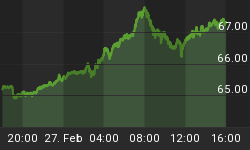This past week, gold and silver experienced one of their steeper drops in recent months. After gold had touched a four month high, and silver came close to a six month high, prices abruptly reversed course. By the end of the week gold had sold off more than 5 percent, and silver was down almost 10 percent (down 6.5 percent on Leap Day alone). Often, such sudden price falls create downward momentum. And it looks as if that may be the case this week. Thus far this week silver has dipped 3 percent.
Based on these sharp movements it would have been logical to assume that some great piece of economic news had been issued that kindled hopes of a strong and sustainable economic recovery either in the U.S. or in Europe. In such case, investors would be expected to pull money out of "defensive" metals and into "aggressive" stocks. But the news on that front was far from reassuring. Alternatively, a selloff in metals would normally be expected if central bankers were to move to tighten monetary policy. That did not happen either.
Instead, this selloff was sparked not by a development, but a non-development. In his address to Congress, Fed Chairman Ben Bernanke offered no clue as to when the Federal Reserve would unleash its next round of quantitative easing. Despite pressure from curious legislators, Bernanke kept his lip buttoned on that very sensitive topic. (See more analysis of the Fed's current predicament in the latest edition of the Euro Pacific newsletter).
The markets took this as a sign that the monetary madness is coming to an end, which would bode poorly for precious metals. Metals are increasingly seen as substitutes for continuously debased fiat money, and tend to do well when new liquidity injections are announced.
Bernanke's failure to telegraph more printing means nothing. Investors are craving a return to normalcy, which means more prudent monetary policy. As a result, many are grasping at straws. But I believe these hopes are premature, and that gold will be buoyed by easy money for quite some time.
In addition, gold will likely be favored by the greatest financial struggle of the coming decade: China's plans to replace the United States as the dominant economic power. As President Reagan remarked, a great country needs a strong currency. Clearly, China shares this creed. Based on its history, fiscal discipline, and its aversion to some of the excesses of Western economies, I feel that China has plans for a gold linked Yuan. If China indeed has these ambitions, the buying pressure placed on gold would remain in place regardless of Mr. Bernanke's intentions.
In the past year, China has become the world's largest producer of gold, mandating that all domestic gold production stay in the country. She has secured major holdings in gold mining companies worldwide and, this year, will likely become the largest international buyer of gold. Recently, China allowed its citizens to own gold and now actively encourages them to do so. Already, China has surpassed India as the largest buyer of gold jewelry.
The West understands as well that the days of unrestrained monetary expansion must come to end. The Anglo-American dominated International Monetary Fund likely favors the ultimate emergence of a new reserve currency, possibly only partially convertible into gold, exclusively for central banks, and run by the IMF.
China appears to be pushing for a fully gold-based Yuan, universally convertible. To accumulate the same 8,400 tonnes supposedly still held by the United States, China would have to accumulate gold for several years. If she continues on this path, it should place a substantial floor under the gold price in the years ahead.
Regardless of who wins the reserve currency race, a key issue will be the gold conversion price. To accommodate the world economy without being recessive, many have concluded that the price of gold would need to be far higher than it is today. In any case, if China continues to pursue a path towards a fully convertible Yuan, investors might be wise to pursue a buy and hold strategy. This of course discounts the possibility that their holdings are not confiscated by debtor governments with plummeting fiat currencies.
Subscribe to Euro Pacific's Weekly Digest: Receive all commentaries by John Browne, Peter Schiff, and other Euro Pacific commentators delivered to your inbox every Monday.
Are you a serious investor? Then don't miss hard-hitting, original analysis in every issue of Euro Pacific Capital's Global Investor newsletter. Click here for more information.
For a great primer on economics, be sure to pick up a copy of Peter Schiff's hit economic parable, How an Economy Grows and Why It Crashes.















